Nursing Industry in Australia: Regulatory Bodies, Skills, Reflection
VerifiedAdded on 2022/08/18
|7
|1825
|15
Essay
AI Summary
This essay provides a comprehensive analysis of the Australian nursing industry, focusing on key regulatory bodies such as AHPRA, NMBA, ANMAC, ACN, and ANMF, and their functions in overseeing the profession. It delves into the essential professional skills required for nurses, including cultural awareness, professionalism, critical thinking, time-keeping, communication, and compassion. The essay also explores the importance of adhering to competency standards and ethical codes. Furthermore, it includes a personal reflection on the author's strengths in communication and weaknesses in dealing with grief, highlighting their experiences and how they have developed these skills. The essay concludes by emphasizing the vital role nurses play in healthcare and the significance of regulatory bodies and professional skills in ensuring quality patient care.
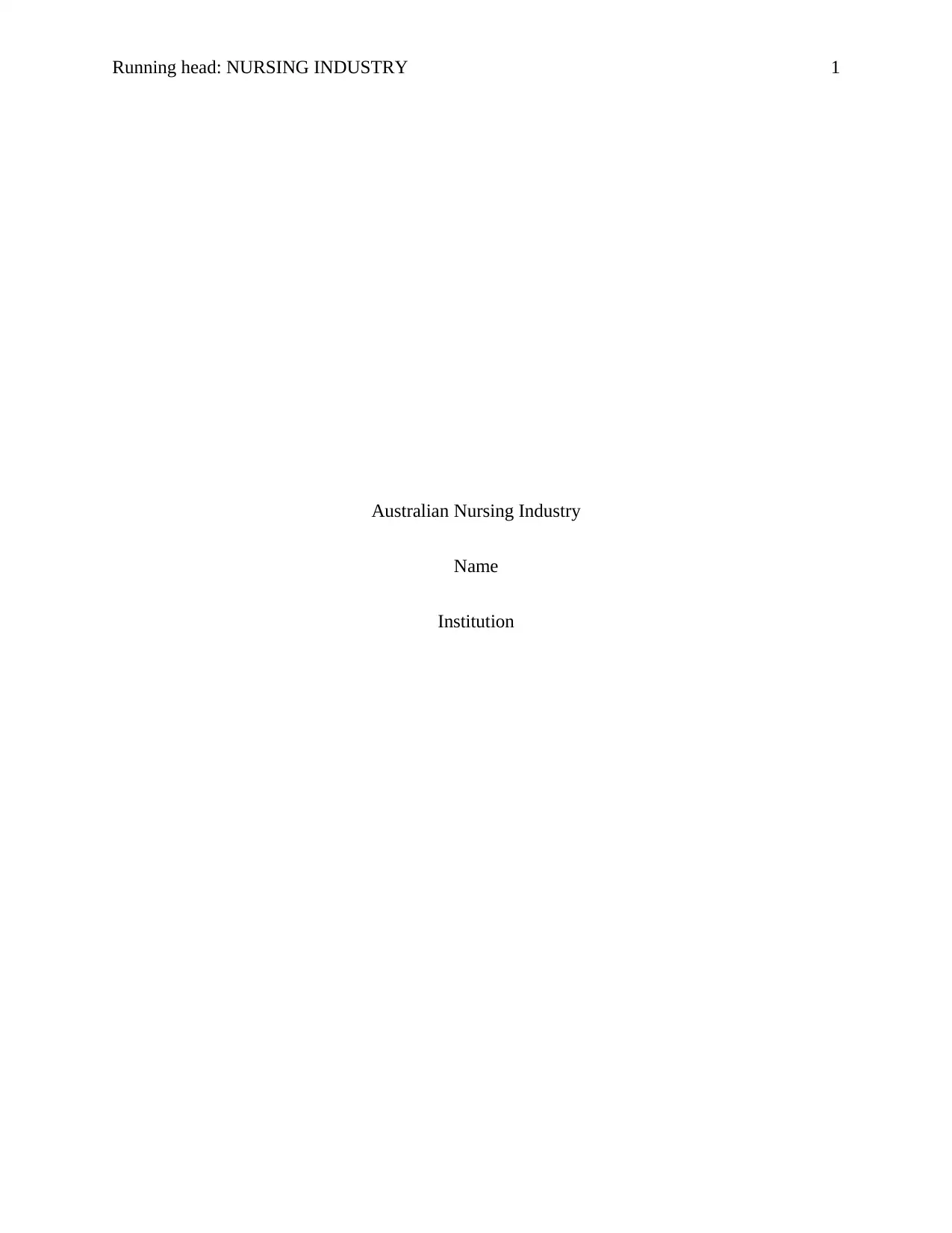
Running head: NURSING INDUSTRY 1
Australian Nursing Industry
Name
Institution
Australian Nursing Industry
Name
Institution
Paraphrase This Document
Need a fresh take? Get an instant paraphrase of this document with our AI Paraphraser
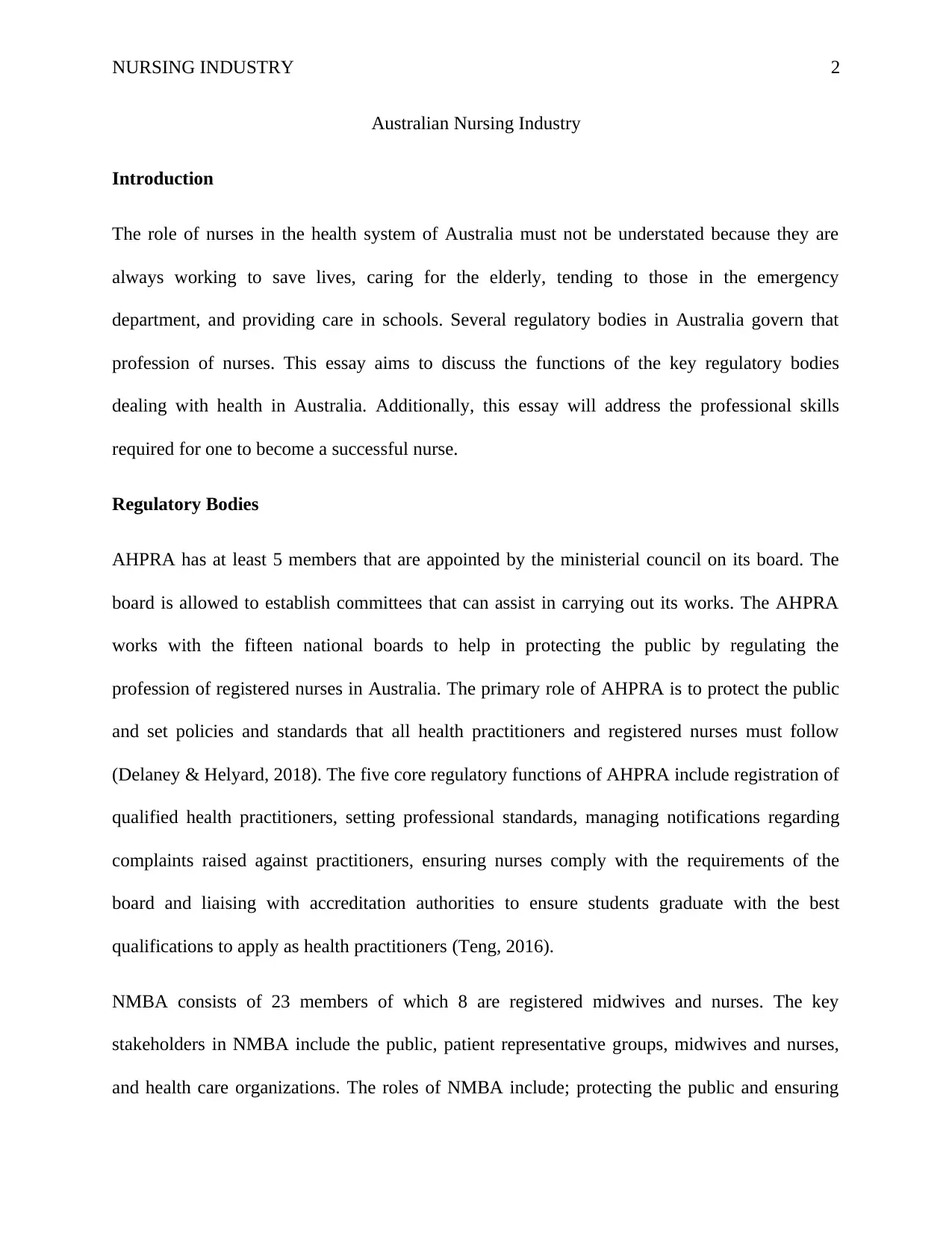
NURSING INDUSTRY 2
Australian Nursing Industry
Introduction
The role of nurses in the health system of Australia must not be understated because they are
always working to save lives, caring for the elderly, tending to those in the emergency
department, and providing care in schools. Several regulatory bodies in Australia govern that
profession of nurses. This essay aims to discuss the functions of the key regulatory bodies
dealing with health in Australia. Additionally, this essay will address the professional skills
required for one to become a successful nurse.
Regulatory Bodies
AHPRA has at least 5 members that are appointed by the ministerial council on its board. The
board is allowed to establish committees that can assist in carrying out its works. The AHPRA
works with the fifteen national boards to help in protecting the public by regulating the
profession of registered nurses in Australia. The primary role of AHPRA is to protect the public
and set policies and standards that all health practitioners and registered nurses must follow
(Delaney & Helyard, 2018). The five core regulatory functions of AHPRA include registration of
qualified health practitioners, setting professional standards, managing notifications regarding
complaints raised against practitioners, ensuring nurses comply with the requirements of the
board and liaising with accreditation authorities to ensure students graduate with the best
qualifications to apply as health practitioners (Teng, 2016).
NMBA consists of 23 members of which 8 are registered midwives and nurses. The key
stakeholders in NMBA include the public, patient representative groups, midwives and nurses,
and health care organizations. The roles of NMBA include; protecting the public and ensuring
Australian Nursing Industry
Introduction
The role of nurses in the health system of Australia must not be understated because they are
always working to save lives, caring for the elderly, tending to those in the emergency
department, and providing care in schools. Several regulatory bodies in Australia govern that
profession of nurses. This essay aims to discuss the functions of the key regulatory bodies
dealing with health in Australia. Additionally, this essay will address the professional skills
required for one to become a successful nurse.
Regulatory Bodies
AHPRA has at least 5 members that are appointed by the ministerial council on its board. The
board is allowed to establish committees that can assist in carrying out its works. The AHPRA
works with the fifteen national boards to help in protecting the public by regulating the
profession of registered nurses in Australia. The primary role of AHPRA is to protect the public
and set policies and standards that all health practitioners and registered nurses must follow
(Delaney & Helyard, 2018). The five core regulatory functions of AHPRA include registration of
qualified health practitioners, setting professional standards, managing notifications regarding
complaints raised against practitioners, ensuring nurses comply with the requirements of the
board and liaising with accreditation authorities to ensure students graduate with the best
qualifications to apply as health practitioners (Teng, 2016).
NMBA consists of 23 members of which 8 are registered midwives and nurses. The key
stakeholders in NMBA include the public, patient representative groups, midwives and nurses,
and health care organizations. The roles of NMBA include; protecting the public and ensuring
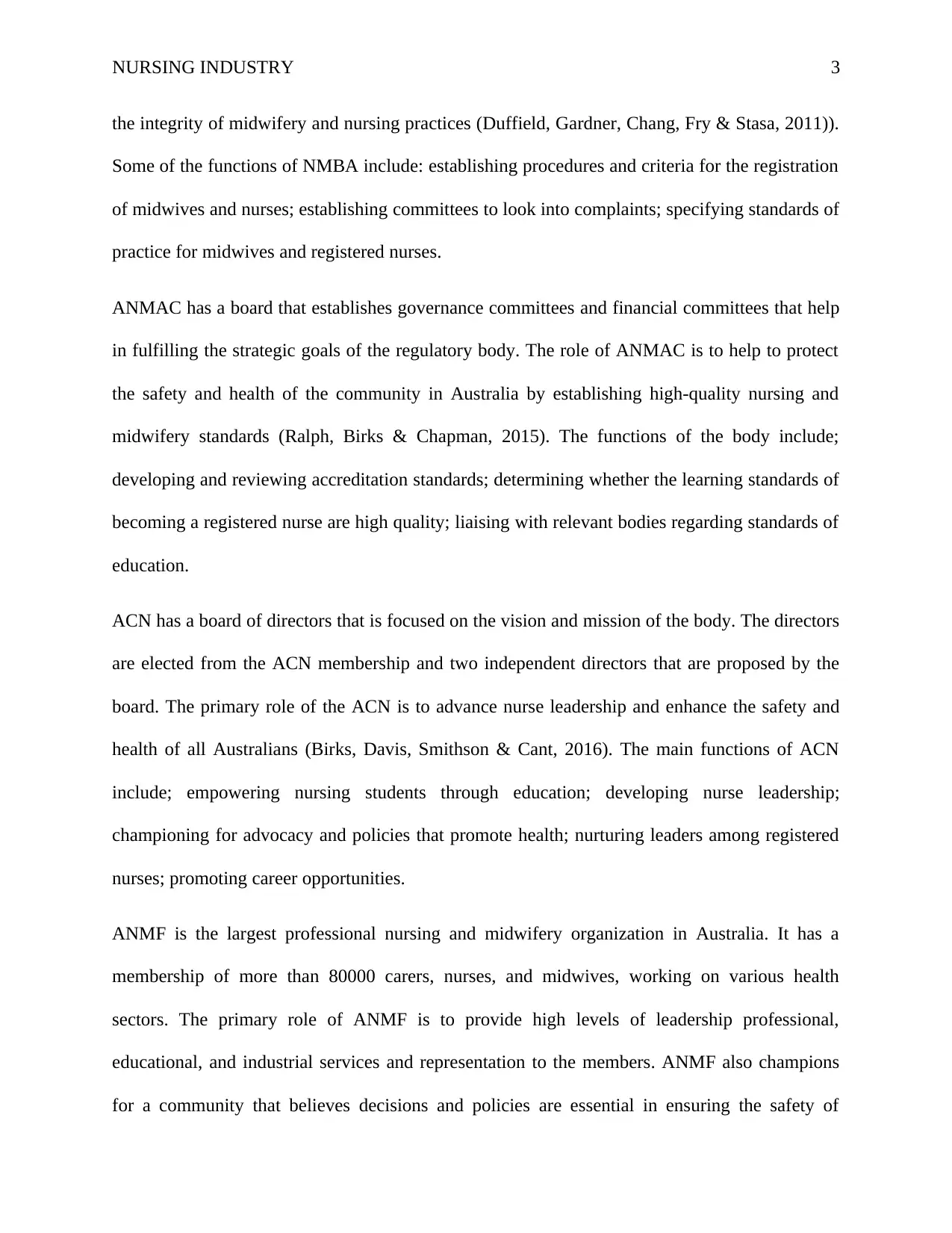
NURSING INDUSTRY 3
the integrity of midwifery and nursing practices (Duffield, Gardner, Chang, Fry & Stasa, 2011)).
Some of the functions of NMBA include: establishing procedures and criteria for the registration
of midwives and nurses; establishing committees to look into complaints; specifying standards of
practice for midwives and registered nurses.
ANMAC has a board that establishes governance committees and financial committees that help
in fulfilling the strategic goals of the regulatory body. The role of ANMAC is to help to protect
the safety and health of the community in Australia by establishing high-quality nursing and
midwifery standards (Ralph, Birks & Chapman, 2015). The functions of the body include;
developing and reviewing accreditation standards; determining whether the learning standards of
becoming a registered nurse are high quality; liaising with relevant bodies regarding standards of
education.
ACN has a board of directors that is focused on the vision and mission of the body. The directors
are elected from the ACN membership and two independent directors that are proposed by the
board. The primary role of the ACN is to advance nurse leadership and enhance the safety and
health of all Australians (Birks, Davis, Smithson & Cant, 2016). The main functions of ACN
include; empowering nursing students through education; developing nurse leadership;
championing for advocacy and policies that promote health; nurturing leaders among registered
nurses; promoting career opportunities.
ANMF is the largest professional nursing and midwifery organization in Australia. It has a
membership of more than 80000 carers, nurses, and midwives, working on various health
sectors. The primary role of ANMF is to provide high levels of leadership professional,
educational, and industrial services and representation to the members. ANMF also champions
for a community that believes decisions and policies are essential in ensuring the safety of
the integrity of midwifery and nursing practices (Duffield, Gardner, Chang, Fry & Stasa, 2011)).
Some of the functions of NMBA include: establishing procedures and criteria for the registration
of midwives and nurses; establishing committees to look into complaints; specifying standards of
practice for midwives and registered nurses.
ANMAC has a board that establishes governance committees and financial committees that help
in fulfilling the strategic goals of the regulatory body. The role of ANMAC is to help to protect
the safety and health of the community in Australia by establishing high-quality nursing and
midwifery standards (Ralph, Birks & Chapman, 2015). The functions of the body include;
developing and reviewing accreditation standards; determining whether the learning standards of
becoming a registered nurse are high quality; liaising with relevant bodies regarding standards of
education.
ACN has a board of directors that is focused on the vision and mission of the body. The directors
are elected from the ACN membership and two independent directors that are proposed by the
board. The primary role of the ACN is to advance nurse leadership and enhance the safety and
health of all Australians (Birks, Davis, Smithson & Cant, 2016). The main functions of ACN
include; empowering nursing students through education; developing nurse leadership;
championing for advocacy and policies that promote health; nurturing leaders among registered
nurses; promoting career opportunities.
ANMF is the largest professional nursing and midwifery organization in Australia. It has a
membership of more than 80000 carers, nurses, and midwives, working on various health
sectors. The primary role of ANMF is to provide high levels of leadership professional,
educational, and industrial services and representation to the members. ANMF also champions
for a community that believes decisions and policies are essential in ensuring the safety of
⊘ This is a preview!⊘
Do you want full access?
Subscribe today to unlock all pages.

Trusted by 1+ million students worldwide
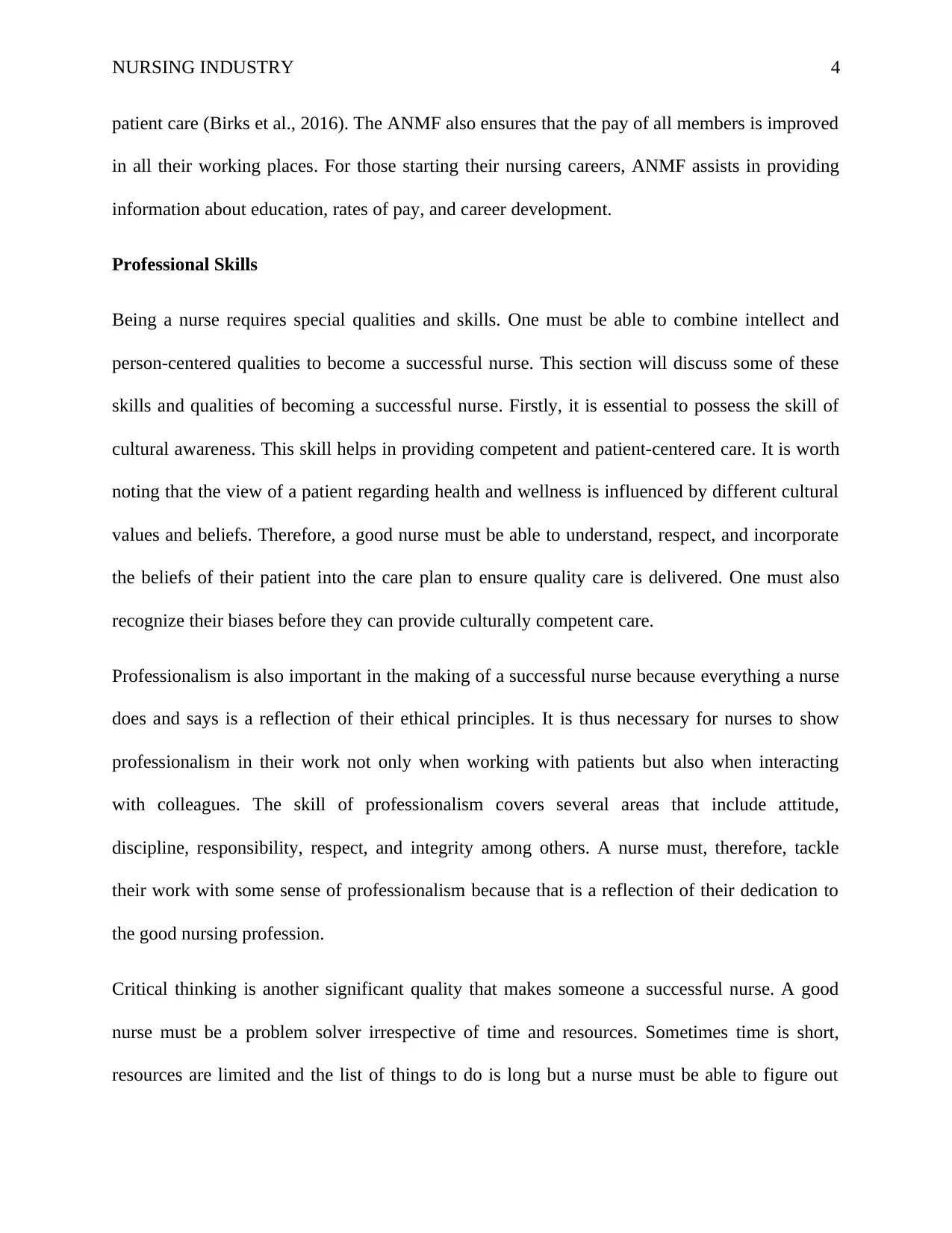
NURSING INDUSTRY 4
patient care (Birks et al., 2016). The ANMF also ensures that the pay of all members is improved
in all their working places. For those starting their nursing careers, ANMF assists in providing
information about education, rates of pay, and career development.
Professional Skills
Being a nurse requires special qualities and skills. One must be able to combine intellect and
person-centered qualities to become a successful nurse. This section will discuss some of these
skills and qualities of becoming a successful nurse. Firstly, it is essential to possess the skill of
cultural awareness. This skill helps in providing competent and patient-centered care. It is worth
noting that the view of a patient regarding health and wellness is influenced by different cultural
values and beliefs. Therefore, a good nurse must be able to understand, respect, and incorporate
the beliefs of their patient into the care plan to ensure quality care is delivered. One must also
recognize their biases before they can provide culturally competent care.
Professionalism is also important in the making of a successful nurse because everything a nurse
does and says is a reflection of their ethical principles. It is thus necessary for nurses to show
professionalism in their work not only when working with patients but also when interacting
with colleagues. The skill of professionalism covers several areas that include attitude,
discipline, responsibility, respect, and integrity among others. A nurse must, therefore, tackle
their work with some sense of professionalism because that is a reflection of their dedication to
the good nursing profession.
Critical thinking is another significant quality that makes someone a successful nurse. A good
nurse must be a problem solver irrespective of time and resources. Sometimes time is short,
resources are limited and the list of things to do is long but a nurse must be able to figure out
patient care (Birks et al., 2016). The ANMF also ensures that the pay of all members is improved
in all their working places. For those starting their nursing careers, ANMF assists in providing
information about education, rates of pay, and career development.
Professional Skills
Being a nurse requires special qualities and skills. One must be able to combine intellect and
person-centered qualities to become a successful nurse. This section will discuss some of these
skills and qualities of becoming a successful nurse. Firstly, it is essential to possess the skill of
cultural awareness. This skill helps in providing competent and patient-centered care. It is worth
noting that the view of a patient regarding health and wellness is influenced by different cultural
values and beliefs. Therefore, a good nurse must be able to understand, respect, and incorporate
the beliefs of their patient into the care plan to ensure quality care is delivered. One must also
recognize their biases before they can provide culturally competent care.
Professionalism is also important in the making of a successful nurse because everything a nurse
does and says is a reflection of their ethical principles. It is thus necessary for nurses to show
professionalism in their work not only when working with patients but also when interacting
with colleagues. The skill of professionalism covers several areas that include attitude,
discipline, responsibility, respect, and integrity among others. A nurse must, therefore, tackle
their work with some sense of professionalism because that is a reflection of their dedication to
the good nursing profession.
Critical thinking is another significant quality that makes someone a successful nurse. A good
nurse must be a problem solver irrespective of time and resources. Sometimes time is short,
resources are limited and the list of things to do is long but a nurse must be able to figure out
Paraphrase This Document
Need a fresh take? Get an instant paraphrase of this document with our AI Paraphraser
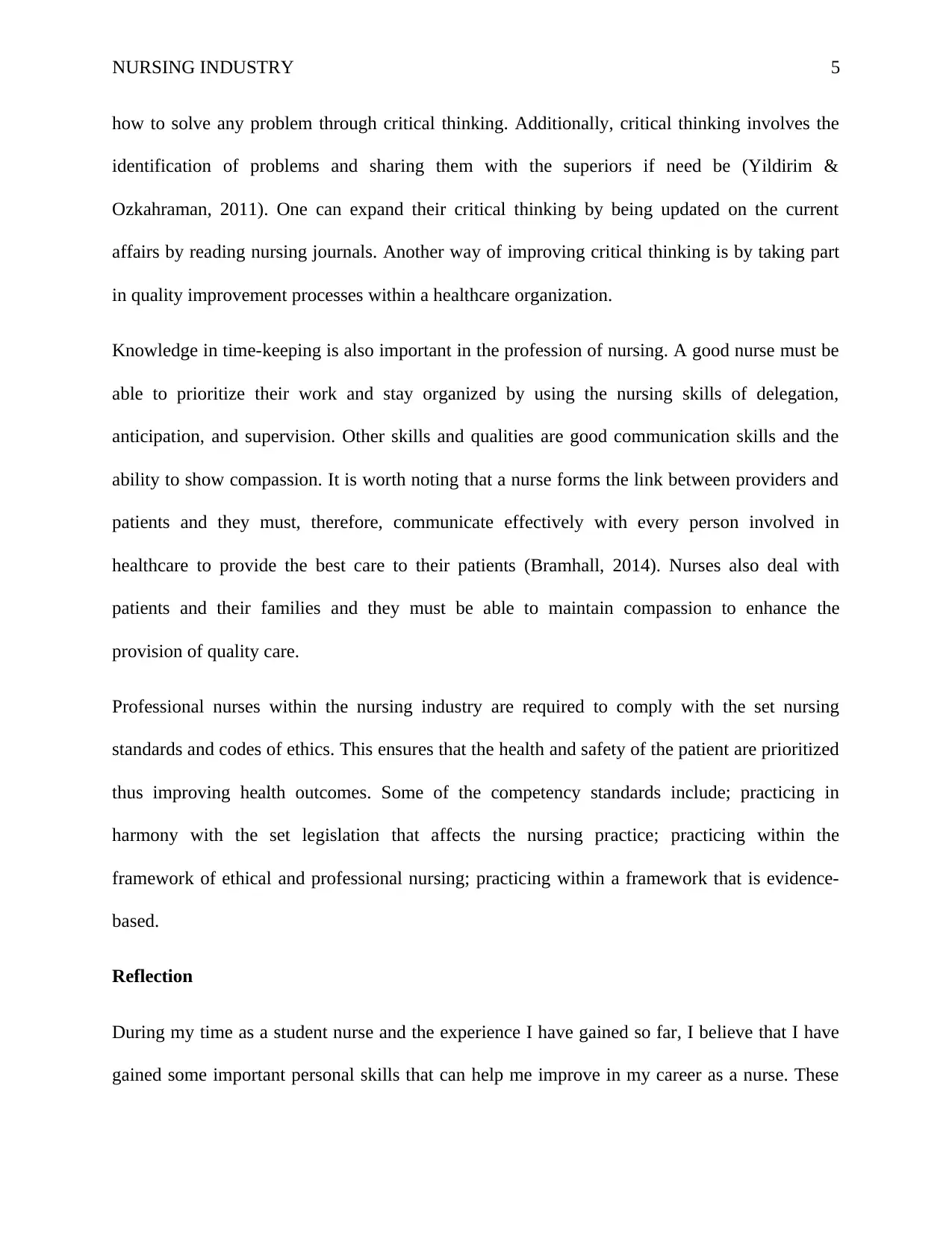
NURSING INDUSTRY 5
how to solve any problem through critical thinking. Additionally, critical thinking involves the
identification of problems and sharing them with the superiors if need be (Yildirim &
Ozkahraman, 2011). One can expand their critical thinking by being updated on the current
affairs by reading nursing journals. Another way of improving critical thinking is by taking part
in quality improvement processes within a healthcare organization.
Knowledge in time-keeping is also important in the profession of nursing. A good nurse must be
able to prioritize their work and stay organized by using the nursing skills of delegation,
anticipation, and supervision. Other skills and qualities are good communication skills and the
ability to show compassion. It is worth noting that a nurse forms the link between providers and
patients and they must, therefore, communicate effectively with every person involved in
healthcare to provide the best care to their patients (Bramhall, 2014). Nurses also deal with
patients and their families and they must be able to maintain compassion to enhance the
provision of quality care.
Professional nurses within the nursing industry are required to comply with the set nursing
standards and codes of ethics. This ensures that the health and safety of the patient are prioritized
thus improving health outcomes. Some of the competency standards include; practicing in
harmony with the set legislation that affects the nursing practice; practicing within the
framework of ethical and professional nursing; practicing within a framework that is evidence-
based.
Reflection
During my time as a student nurse and the experience I have gained so far, I believe that I have
gained some important personal skills that can help me improve in my career as a nurse. These
how to solve any problem through critical thinking. Additionally, critical thinking involves the
identification of problems and sharing them with the superiors if need be (Yildirim &
Ozkahraman, 2011). One can expand their critical thinking by being updated on the current
affairs by reading nursing journals. Another way of improving critical thinking is by taking part
in quality improvement processes within a healthcare organization.
Knowledge in time-keeping is also important in the profession of nursing. A good nurse must be
able to prioritize their work and stay organized by using the nursing skills of delegation,
anticipation, and supervision. Other skills and qualities are good communication skills and the
ability to show compassion. It is worth noting that a nurse forms the link between providers and
patients and they must, therefore, communicate effectively with every person involved in
healthcare to provide the best care to their patients (Bramhall, 2014). Nurses also deal with
patients and their families and they must be able to maintain compassion to enhance the
provision of quality care.
Professional nurses within the nursing industry are required to comply with the set nursing
standards and codes of ethics. This ensures that the health and safety of the patient are prioritized
thus improving health outcomes. Some of the competency standards include; practicing in
harmony with the set legislation that affects the nursing practice; practicing within the
framework of ethical and professional nursing; practicing within a framework that is evidence-
based.
Reflection
During my time as a student nurse and the experience I have gained so far, I believe that I have
gained some important personal skills that can help me improve in my career as a nurse. These
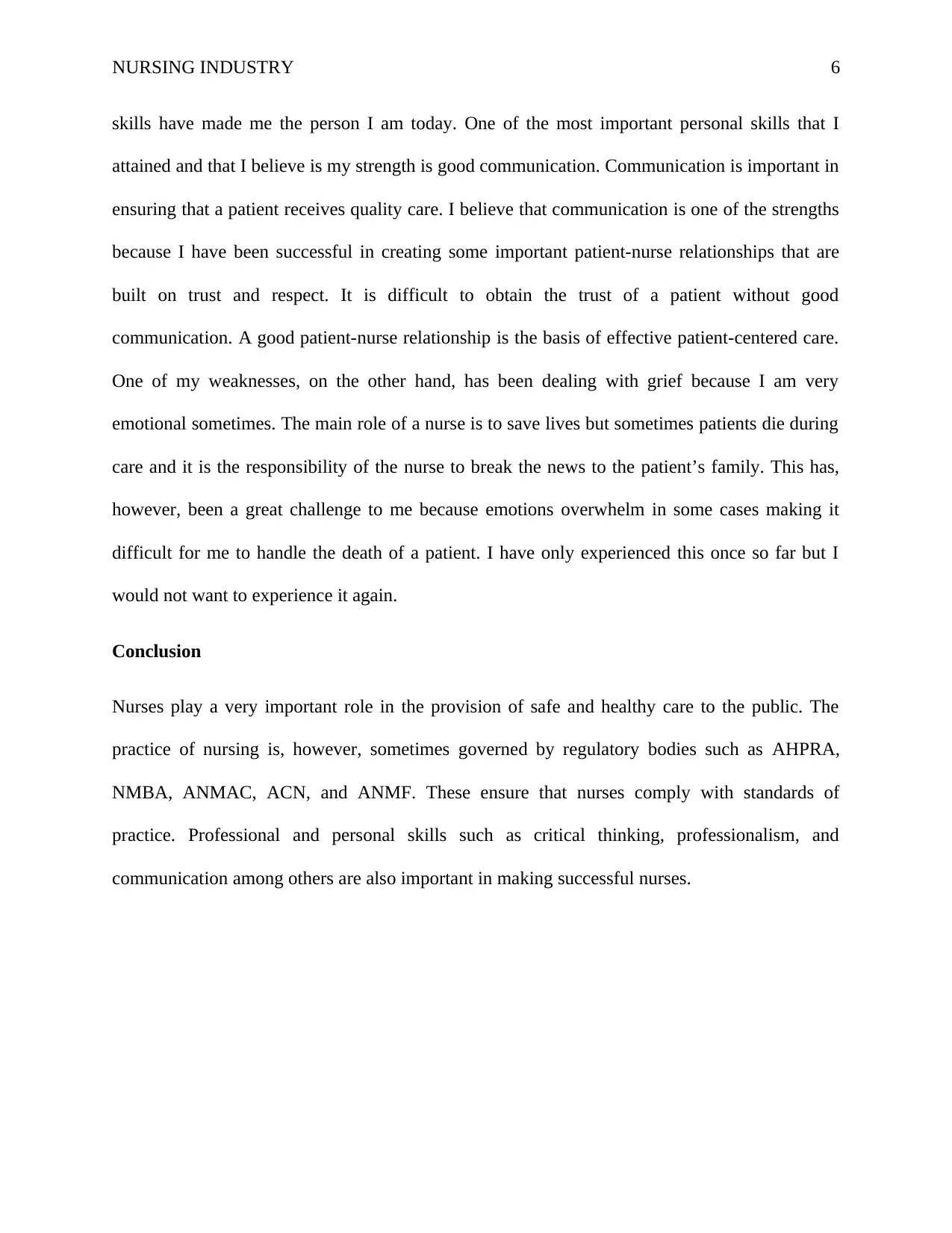
NURSING INDUSTRY 6
skills have made me the person I am today. One of the most important personal skills that I
attained and that I believe is my strength is good communication. Communication is important in
ensuring that a patient receives quality care. I believe that communication is one of the strengths
because I have been successful in creating some important patient-nurse relationships that are
built on trust and respect. It is difficult to obtain the trust of a patient without good
communication. A good patient-nurse relationship is the basis of effective patient-centered care.
One of my weaknesses, on the other hand, has been dealing with grief because I am very
emotional sometimes. The main role of a nurse is to save lives but sometimes patients die during
care and it is the responsibility of the nurse to break the news to the patient’s family. This has,
however, been a great challenge to me because emotions overwhelm in some cases making it
difficult for me to handle the death of a patient. I have only experienced this once so far but I
would not want to experience it again.
Conclusion
Nurses play a very important role in the provision of safe and healthy care to the public. The
practice of nursing is, however, sometimes governed by regulatory bodies such as AHPRA,
NMBA, ANMAC, ACN, and ANMF. These ensure that nurses comply with standards of
practice. Professional and personal skills such as critical thinking, professionalism, and
communication among others are also important in making successful nurses.
skills have made me the person I am today. One of the most important personal skills that I
attained and that I believe is my strength is good communication. Communication is important in
ensuring that a patient receives quality care. I believe that communication is one of the strengths
because I have been successful in creating some important patient-nurse relationships that are
built on trust and respect. It is difficult to obtain the trust of a patient without good
communication. A good patient-nurse relationship is the basis of effective patient-centered care.
One of my weaknesses, on the other hand, has been dealing with grief because I am very
emotional sometimes. The main role of a nurse is to save lives but sometimes patients die during
care and it is the responsibility of the nurse to break the news to the patient’s family. This has,
however, been a great challenge to me because emotions overwhelm in some cases making it
difficult for me to handle the death of a patient. I have only experienced this once so far but I
would not want to experience it again.
Conclusion
Nurses play a very important role in the provision of safe and healthy care to the public. The
practice of nursing is, however, sometimes governed by regulatory bodies such as AHPRA,
NMBA, ANMAC, ACN, and ANMF. These ensure that nurses comply with standards of
practice. Professional and personal skills such as critical thinking, professionalism, and
communication among others are also important in making successful nurses.
⊘ This is a preview!⊘
Do you want full access?
Subscribe today to unlock all pages.

Trusted by 1+ million students worldwide
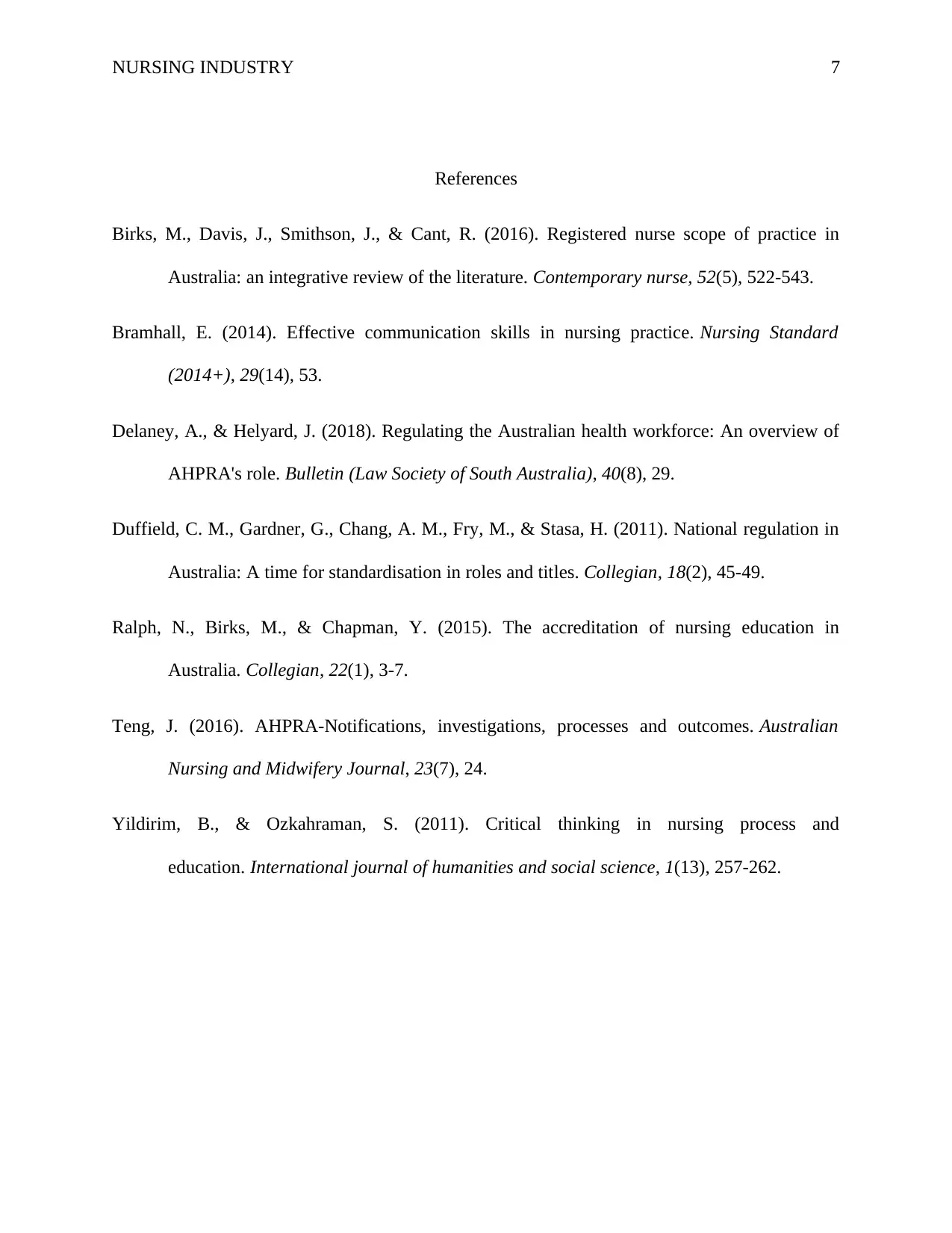
NURSING INDUSTRY 7
References
Birks, M., Davis, J., Smithson, J., & Cant, R. (2016). Registered nurse scope of practice in
Australia: an integrative review of the literature. Contemporary nurse, 52(5), 522-543.
Bramhall, E. (2014). Effective communication skills in nursing practice. Nursing Standard
(2014+), 29(14), 53.
Delaney, A., & Helyard, J. (2018). Regulating the Australian health workforce: An overview of
AHPRA's role. Bulletin (Law Society of South Australia), 40(8), 29.
Duffield, C. M., Gardner, G., Chang, A. M., Fry, M., & Stasa, H. (2011). National regulation in
Australia: A time for standardisation in roles and titles. Collegian, 18(2), 45-49.
Ralph, N., Birks, M., & Chapman, Y. (2015). The accreditation of nursing education in
Australia. Collegian, 22(1), 3-7.
Teng, J. (2016). AHPRA-Notifications, investigations, processes and outcomes. Australian
Nursing and Midwifery Journal, 23(7), 24.
Yildirim, B., & Ozkahraman, S. (2011). Critical thinking in nursing process and
education. International journal of humanities and social science, 1(13), 257-262.
References
Birks, M., Davis, J., Smithson, J., & Cant, R. (2016). Registered nurse scope of practice in
Australia: an integrative review of the literature. Contemporary nurse, 52(5), 522-543.
Bramhall, E. (2014). Effective communication skills in nursing practice. Nursing Standard
(2014+), 29(14), 53.
Delaney, A., & Helyard, J. (2018). Regulating the Australian health workforce: An overview of
AHPRA's role. Bulletin (Law Society of South Australia), 40(8), 29.
Duffield, C. M., Gardner, G., Chang, A. M., Fry, M., & Stasa, H. (2011). National regulation in
Australia: A time for standardisation in roles and titles. Collegian, 18(2), 45-49.
Ralph, N., Birks, M., & Chapman, Y. (2015). The accreditation of nursing education in
Australia. Collegian, 22(1), 3-7.
Teng, J. (2016). AHPRA-Notifications, investigations, processes and outcomes. Australian
Nursing and Midwifery Journal, 23(7), 24.
Yildirim, B., & Ozkahraman, S. (2011). Critical thinking in nursing process and
education. International journal of humanities and social science, 1(13), 257-262.
1 out of 7
Related Documents
Your All-in-One AI-Powered Toolkit for Academic Success.
+13062052269
info@desklib.com
Available 24*7 on WhatsApp / Email
![[object Object]](/_next/static/media/star-bottom.7253800d.svg)
Unlock your academic potential
Copyright © 2020–2026 A2Z Services. All Rights Reserved. Developed and managed by ZUCOL.





